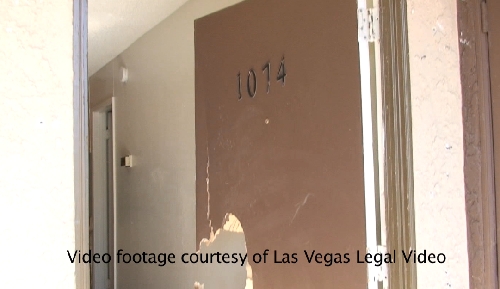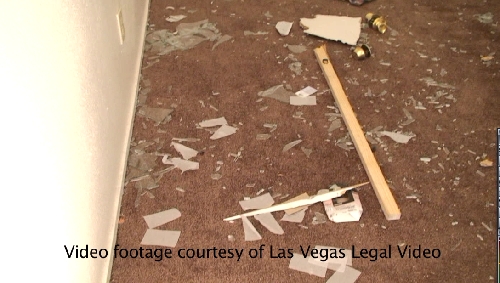Shooting shows risk in police drug raids
On the night of June 11, a team of Las Vegas police officers forced their way into a central valley apartment, breaking through the front door and smashing windows.
The team was serving a drug search warrant after undercover officers said they bought marijuana three times from the 21-year-old male resident of the apartment.
During the raid, police killed Trevon Cole, who was unarmed in the bathroom when he was shot in the face, his fiancee told the Review-Journal.
Police claim Cole made a "furtive movement" toward a detective before he was shot once.
An unspecified amount of marijuana and digital scales were seized. No weapons were recovered.
Drug raids, according to national experts, can be successful in getting illegal substances and dealers off the streets. But one civil rights advocate cautioned that such operations pose a high risk to the public and those involved.
In 2009, the Metropolitan Police Department's Narcotics Section served 569 search warrants throughout the valley, said department spokesman officer Jacinto Rivera. None of the narcotics warrants served last year escalated into situations where an officer had to fire his weapon, Rivera said.
The last Las Vegas police raid involving shots fired happened in December 2008. Las Vegas SWAT officers attempted to serve a narcotics warrant in Henderson on a suspect who had sold cocaine to undercover officers. Three officers were shot by suspect Emmanuel Dozier, who said he thought someone was breaking into his home. All the officers survived.
Police officials wouldn't answer questions about Cole's shooting until a coroner's inquest is held. During the inquest, a jury will determine whether the actions of the officer who pulled the trigger, 34-year-old Bryan Yant, were justified, excusable or criminal.
Tod Burke, a criminal justice professor at Radford University in Virginia, said, in general, marijuana isn't a drug that compels raids on homes unless the suspect is more than your average street dealer.
"Most police departments and detectives won't focus on small-time drug dealers," Burke said. "If they do, they are going after the small person to get to the big person."
Allen Lichtenstein, general counsel for the American Civil Liberties Union of Nevada, said police need to exercise discretion when deciding whether to conduct a raid.
"A major raid at night on a residential street carries enormous risks," Lichtenstein said. "Raids should only be done in situations in which the dangers (posed by the suspected drug dealers) outweigh the risks."
Andre Lagomarsino, an attorney retained by Cole's family, said the slain man was the victim of overzealous police and was a threat to no one. Searches of nationwide databases indicate Cole had no adult criminal record.
"I don't think they should have a violent raid like that for someone who was allegedly involved in marijuana," Lagomarsino said. "In this case, it was literally overkill."
Cole's fiancée, 20-year-old Sequioa Pearce, gave birth to his daughter earlier this month shortly after Cole was killed.
Yant, a 10-year veteran of the department, has been placed on paid leave pending the outcome of the inquest. Cole's shooting was the third time Yant has fired his weapon and struck a suspect.
According to Rivera, Las Vegas police serve three classes of search warrants. The officers who serve them are required to have specialized training.
A Class 1 warrant is served when police do not anticipate having to force entry, when the suspect does not have a history of violence and when the suspect isn't likely to be armed. Officers serving Class 1 warrants must take two days of classroom training.
A Class 2 warrant is served when a suspect does not have a history of violence but may have access to weapons. Officers serving these warrants must have two days of classroom training and eight hours of tactical training given by SWAT.
A Class 3 warrant can only be served by SWAT officers and is used when the suspect has a history of violence, a vicious animal might be present or the residence is heavily fortified.
Police haven't disclosed what type of warrant was served at Cole's residence or how many officers were present. A resident of the complex, the Mirabella Apartments, said he saw about eight armed officers swarm the apartment.
Lagomarsino said the officers were wearing camouflage and masks. One shell casing from an AR-15 assault rifle was recovered at the scene, according to a list of items taken by police in the search warrant.
Police said they did knock on the door and identify themselves before entering the apartment. Lagomarsino contends police didn't announce their presence.
Lagomarsino said Cole and Pearce were in bed watching television about 9 p.m. when police broke into their 624-square-foot apartment on Bonanza Road near Eastern Avenue.
When officers rushed in, Cole fled to the bathroom and Peace ran into a closet. Pearce said they didn't answer the knocks on the door because they thought it was Pearce's mother, who was angry at her that day.
Lagomarsino said Cole was following police orders in the bathroom. A former linebacker for Moorpark College in Southern California, Cole was 6 feet tall and weighed 285 pounds. He was wearing basketball shorts and a T-shirt.
"Not only were there no weapons in the house, there was nothing in his hand," Lagomarsino said.
Burke, who was a patrol officer for five years in Maryland during the late 1970s and early 1980s, said drug raids usually are conducted at night to catch suspects off-guard. He said night raids usually are safer for police because they have the element of surprise. Raids also have to be done covertly or police might never seize any drugs.
"There's going to be a plumbing problem," Burke said. "Drugs will be flushed down the toilet."
Bill Sousa, a criminal justice professor at the University of Nevada, Las Vegas, contends there is no evidence that drug raids make the community less safe.
"Whenever citizens see overuse of force, that makes people less comfortable. But it doesn't necessarily make them less safe," Sousa said.
However, he said, police need to be sensitive to the community's perception of what they are doing.
"Do they want an image of a police officer that is paramilitary in nature?" Sousa said. "Or do they want an image that is not paramilitary but perceived in a way that is providing a service to the community?"
Sousa said some law enforcement departments do conduct raids in cases of suspected marijuana dealers if the nature of the drug trade in the area justifies it. Sousa said marijuana has been associated with an increased level of violence in some cities. Sousa explained that some drug dealers like to deal with marijuana only because being arrested for selling it yields a less severe punishment than other street drugs.
Sousa said that can create competition between dealers, which sometimes leads to violence. "That's when it becomes a very serious issue in communities."
Lagomarsino said Cole's death has devastated his family.
"We cannot say definitively at this point whether we're going to sue, but everything we have uncovered points in that direction."
Contact reporter Antonio Planas at aplanas@reviewjournal.com or 702-383-4638.


















